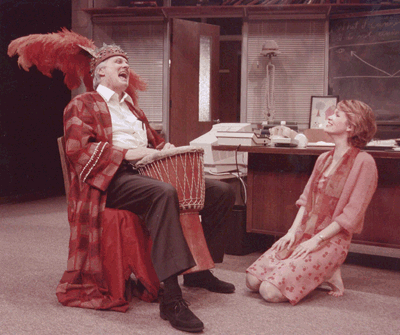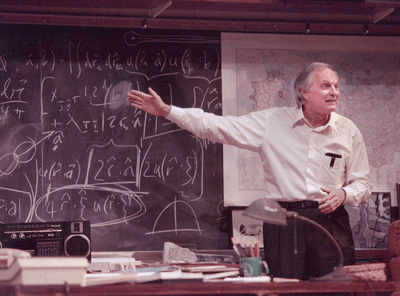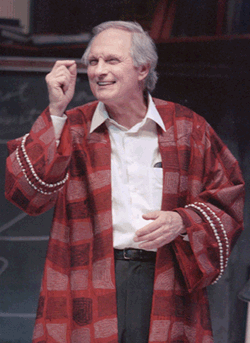QED
Peter Parnell
25 March 2001, Mark Taper Forum, Los Angeles

Richard Feynman was the star of his own life. Feynman played Feynman, and he played it to the hilt. He was always on stage, whenever he had an audience, no matter how small. Although I don’t know him at all, I suspect that, like Feynman, Alan Alda plays Alan Alda. And so, now at the Mark Taper Forum in Los Angeles, before a house that was sold out for its entire run before it even opened, we have Alan Alda playing Alan Alda playing Richard Feynman playing Richard Feynman, in a play by Peter Parnell, called QED.
And it works! Alda doesn’t look like Feynman, and, in spite of what must have been valiant efforts, he doesn’t sound much like him either. (Oddly, in the previous play at the Taper, called Glimmer, Glimmer and Shine, there was an actor named John Spencer who did look and sound like Feynman.) I came to the play fearing that Alda would talk the talk and walk the walk, but, like one of those south Pacific cargo cults Feynman used to like to talk about, it would be all outward appearance, lacking the inner guts that made Feynman who he was. Miraculously, almost the exact opposite happens. Alda puts the Dick Feynman I knew back up there, on the stage, where he always belonged.
The play takes place in Feynman’s office at the California Institute of Technology. Like Alda himself, the set doesn’t look like the real thing, but captures its spirit. It is a Saturday morning, near the end of his life. That night, Feynman is to appear beating his bongo drums as the chief of Bali Hai in the Caltech student production of the Rodgers and Hammerstein musical South Pacific.
In the course of the day, Feynman learns by phone from his doctors that his cancer has returned and new, even more perilous surgery is needed. He debates his treatment with his doctors, and he debates the form of the final report on the Challenger disaster, again by phone, with the Chairman of the investigating commission, former secretary of state William Rogers.
He works on a public lecture he had forgotten he was supposed to give in a couple of days. Some Russians arrive at the airport and show up off-stage, part of a scheme to gain entry to the mysterious land of Tuva. All the while, he talks to his audience, in the Feynman idiom, about things big and small, physics, sketching nude women, his father, his first wife, himself.
There are lots of good laugh lines, and Alda delivers them impeccably. He prowls around the stage, occasionally writing on the blackboard or beating his drums. There is physics in Alda’s long monologue, enough of it, and done right, to tell the audience that it was physics that lit Feynman’s fire, and the rest was window dressing. (Well, not all of it. He liked the women too).
Late that night, in the second act, the only other character in the play shows up. She’s a very pretty young student, slightly tipsy from the after-the-play party (Feynman would have loved it). Her role in the drama is to help pull him out of the growing depression that his own condition and his memories of the death of his first wife, Arlene, have cast him into. And that works too.
There have been important plays written about scientists. Bertold Brecht’s Galileo comes to mind as does In the Matter of J Robert Oppenheimer by Heinar Kipphardt. When I saw the Kipphardt play at the Taper years ago, the actor who played Edward Teller looked like Hans Bethe, and the actor who played Bethe looked like Teller. Most of the audience would not have known or cared. More recently, Copenhagen by Michael Frayn, portrayed various versions of Werner Heisenberg’s visit to Niels Bohr during the Second World War (Physics World July 1998 pp35-36, print version only).
Feynman’s life did not contain the kind of moral dilemma faced by the personages in those plays (although Parnell gets considerable dramatic mileage out of Los Alamos and the making of the bomb). This is not a play of ideas, but rather a character sketch. Ah, but what a character! Parnell’s QED, as played by Alan Alda, is a fitting tribute to an old friend of mine who just happened to be one of the most singular characters to roam the Earth in the 20th century.
I purposely skipped “Caltech night” at the Taper so I could see the play among an ordinary audience and make up my own mind. At the end of the play, the ordinary audience came forth with an instantaneous, spontaneous standing ovation. I’m not sure whether they were applauding Alda or Feynman. I guess it doesn’t matter.
* QED continues at the Mark Taper Forum, 135 N Grand Avenue, Los Angeles, CA-90012, USA, until 13 May (tel. +1 213 628 2772; e-mail tickets@ctgla.com; www.centertheatregroup.com)





